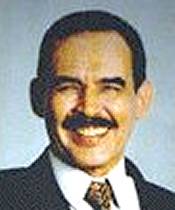
Politics of the Gambia takes place within the framework of a presidential republic, whereby the President of the Gambia is both head of state and head of government, and of a multi-party system. Executive power is exercised by the government. Legislative power is vested in both the government and parliament.
The Movement for Multi-party Democracy (MMD) is a political party in Zambia. Originally formed to oust the previous government, MMD controlled an absolute majority in parliament between 1991 and 2001, when its past leader, Frederick Chiluba was President of Zambia. Its election into power in 1991 ended the 27-year rule of President Kenneth Kaunda and his United National Independence Party (UNIP). It remained the dominant party within Zambian politics until the general elections of September 2011. It is a centre-left political party.

Federal elections were held in Australia on 10 November 2001. All 150 seats in the House of Representatives and 40 seats in the 76-member Senate were up for election. The incumbent Liberal Party of Australia led by Prime Minister of Australia John Howard and coalition partner the National Party of Australia led by John Anderson defeated the opposition Australian Labor Party led by Kim Beazley.

The 1998 Australian federal election was held to determine the members of the 39th Parliament of Australia. It was held on 3 October 1998. All 148 seats of the House of Representatives and 40 seats of the 76-seat Senate were up for election. The incumbent centre-right Liberal/National Coalition government led by Prime Minister John Howard of the Liberal Party and coalition partner Tim Fischer of the National Party defeated the centre-left Australian Labor Party opposition led by Opposition Leader Kim Beazley.

The British Columbia general election of 2001 was the 37th provincial election in the Province of British Columbia, Canada. It was held to elect members of the Legislative Assembly of British Columbia. The election was called on April 18, 2001, and held on May 16, 2001. Voter turnout was 55.4 per cent of all eligible voters.

The Alberta general election of 2004 was the twenty-sixth general election for the province of Alberta, Canada. It was held on November 22, 2004 to elect members of the Legislative Assembly of Alberta.
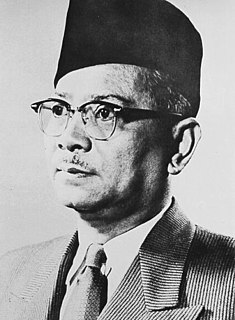
A general election was held on Saturday, 10 May 1969 for members of the 3rd Parliament of Malaysia, although voting was postponed until between 6 June and 4 July 1970 in Sabah and Sarawak. This election marked the first parliamentary election held in Sabah and Sarawak after the formation of Malaysia in 1963.
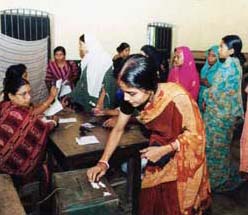
Elections in Bangladesh gives information on election and election results in Bangladesh.

The 2005 United Kingdom general election was held on Thursday 5 May 2005, to elect 646 members to the House of Commons. The Labour Party led by Tony Blair won its third consecutive victory, with Blair becoming the only Labour leader beside Harold Wilson to form three majority governments. However, its majority now stood at 66 seats compared to the 160-seat majority it had previously held. As of 2019, it remains the last general election victory for the Labour Party.
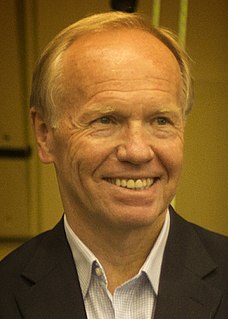
An election was held in the Australian state of Queensland on 17 February 2001 to elect the 89 members of the state's Legislative Assembly. The result of the election was the return of the Labor Party (ALP) government of Premier Peter Beattie, with an increased majority. Labor won 66 seats, easily the most it has ever won in Queensland and one of Labor’s best-ever results nationwide. There was a 10.07% swing towards Labor, while One Nation suffered a 13.98% swing against it, losing eight seats.

The Parliament of Ghana is the legislative body of the Government of Ghana.
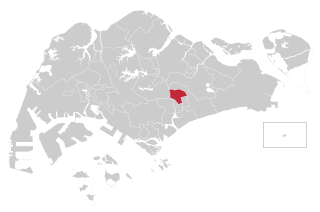
Potong Pasir Single Member Constituency is a Single Member Constituency (SMC) in the central region of Singapore. Established in 1968, this constituency encompasses the town of Potong Pasir, Blocks 210 to 224 of Lorong 8 Toa Payoh, the Sennett and Tannery private estates, as well as the Alkaff Neighborhood of the upcoming Bidadari estate. The People's Action Party (PAP)'s Sitoh Yih Pin has been the Member of Parliament (MP) for Potong Pasir SMC since 2011. It was carved out of Aljunied in 1968.

Hougang Single Member Constituency is a Single Member Constituency Consisting of Hougang Aves 2,5,7 and Hougang Central located in the north-eastern area of Singapore. It is surrounded by Aljunied Group Representation Constituency (GRC) in the south and east, and Ang Mo Kio GRC in the west. It is currently held by Mr Png Eng Huat, MP from the Workers' Party (WP).
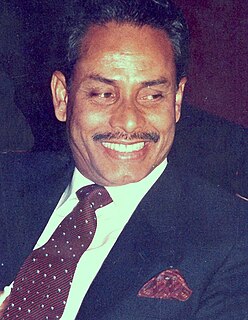
General elections were held in Bangladesh on 7 May 1986. A total of 1,527 candidates contested the election. The result was a victory for the Jatiya Party, which won 153 of the 300 seats. Voter turnout was 61.1%. Bangladesh Nationalist Party, the winner of the previous elections, boycotted the election.

General elections were held in Bangladesh on 3 March 1988. They were boycotted by several major parties, including the Bangladesh Awami League, the Bangladesh Nationalist Party, the Communist Party of Bangladesh, Jamaat-e-Islami Bangladesh, the Bangladesh Krishak Sramik Awami League, the National Awami Party (Muzaffar) and the Workers Party of Bangladesh. The result was a victory for the Jatiya Party, which won 251 of the 300 seats. Voter turnout was 52.5%.
The Sixth National Parliamentary Elections 1996 was held in Bangladesh on 15 February 1996. They were boycotted by most opposition parties, and saw voter turnout drop to just 21%. The result was a victory for the Bangladesh Nationalist Party (BNP), which won 300 of the 300 elected seats. This administration was short lived however, only lasting 12 days before the installation of caretaker government and fresh elections held in June.
Parliamentary elections were held in Albania on 24 June 2001. The result was a victory for the ruling Socialist Party of Albania, which won 73 of the 140 seats, resulting in Ilir Meta remaining Prime Minister. Voter turnout was 53.6%.

By-elections to Andipatti constituency was held in Tamil Nadu, India, on February 21, 2002. Three state assembly constituencies, Saidapet, Vaniyambadi, and Acharapakkam were held on May 31, 2002. In 2003, by-election in Sathankulam was held on February 26, 2003. During this by-election, the DMK and all the other major parties supported the Congress candidate, while only BJP supported the AIADMK candidate. This election came after the support of the Anti-conversion bill by AIADMK chief, Jayalalithaa and increasing tension between DMK and BJP due to the passage of the bill. The AIADMK win in Sathankulam was significant, since it completes the AIADMK sweep in by-elections after its victory in 2001. Also the anti-conversion bill was not an important factor in the congress-bastion Sathankulam, whose electorate consists of a large percentage of minorities.

General elections were held in Zambia on 27 December 2001 to elect a President and National Assembly. The result was a victory for the ruling Movement for Multi-Party Democracy, which won 69 of the 150 National Assembly seats and whose candidate, Levy Mwanawasa, won the presidential vote.
The 1999 Rother District Council election took place on 6 May 1999 to elect members of Rother District Council in East Sussex, England. The whole council was up for election and the Conservative party gained overall control of the council from no overall control.


